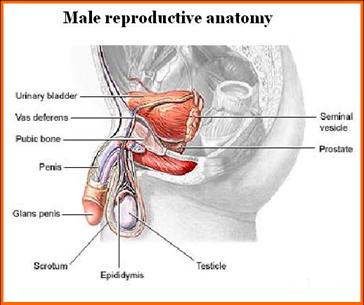










|
*The male reproductive structures include the penis, the scrotum, the seminal vesicles and the prostate |
|
.PROSTATE CANCER
What is prostate cancer?
Prostate cancer is the abnormal growth of cells in a man's prostate gland. The prostate sits just below the bladder. It makes part of the fluid for semen. In young men, the prostate is about the size of a walnut. It usually grows larger as you grow older.
Prostate cancer is common and is an older man's disease. Most men who get it are older than 65. Most cases are curable because they are found before the cancer has spread to other parts of the body.
For information on cancer that has come back or spread to other parts of the body, see the topic Prostate Cancer, Advanced or Metastatic.
What causes prostate cancer?
Experts don't know what causes prostate cancer, but they believe that your age, family history, and race affect your chances of getting it. Eating a high-fat diet may also add to your chances of getting it.
What are the symptoms?
Prostate cancer usually does not cause symptoms in its early stages. Most men don't know they have it until it is found during a regular medical exam. When there are symptoms, they mostly involve having problems with urination. Symptoms may include:
· Having difficulty starting your urine stream. · Having a weaker than normal urine stream. · Being unable to urinate at all. · Having to urinate often. · Feeling that your bladder is not emptying completely when you urinate. · Having to get up at night to urinate. · Having pain or a burning feeling when you urinate. · Having blood in your urine. Having a deep pain in your lower back, abdomen, hip, or pelvis.
How is prostate cancer diagnosed?
Your doctor may suspect prostate cancer after a digital rectal exam and a prostate-specific antigen (PSA) blood test. However, a biopsy, in which your doctor takes a sample of tissue from your prostate gland, is the only sure way to know.
How will my prostate cancer be treated?
Because most prostate cancer grows very slowly, some men have no symptoms and are not treated at all. Instead, their doctors check them regularly for symptoms for the rest of their lives. When treatment is necessary, it usually involves surgery or radiation to remove or destroy the cancer. Your treatment will depend on what kind of cancer cells you have, how far they have spread, your age and general health, and your preferences. About 90% of prostate cancers are found in the early stages, where the 5-year survival rate is almost 100%.
(Preventing the testicles from producing testosterone may relieve many of the above symptoms.) The major treatment options for prostate cancer include: · Hormonal therapy · Surgery · Radiation · Chemotherapy Watchful waiting (Observation)
(The specific options selected for your treatment will depend on several factors including age, the stage of the disease, and the advice of a physician.)
Will treatment affect my sex life?
Both surgery and radiation may cause impotence, which means not being able to have an erection.
Nerves that help control a man's ability to have an erection may be removed or damaged during surgery because they are right next to the prostate and the cancer may have spread to them. Many times a special form of surgery, called nerve-sparing surgery, can be used to try to avoid damaging the nerves. These same nerves can also be damaged by the X-rays that are used in radiation therapy. |
|
TOP |